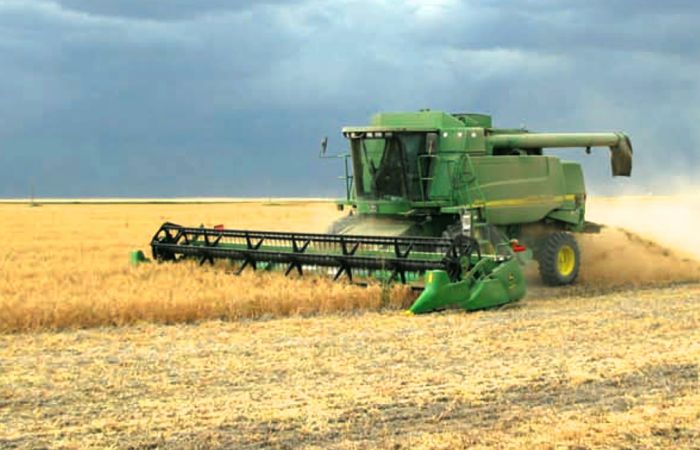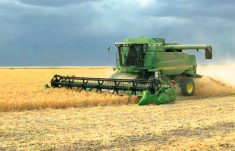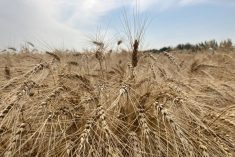Our online grain markets columnist Brian Wittal welcomes feedback and information on market conditions in your area, such as current offering prices, basis levels, trucking premiums and special crops contracts. Contact Brian today.
April 17 — The markets over all seem to have turned more positive this past week on continued talk that maybe we have seen the bottom of this recession, as some reported company earnings are coming in at levels better than expected and investment dollars seem to be coming back into the markets slowly.
Read Also

Saskatchewan harvest lags behind
At 12 per cent complete as of Aug. 25, harvest progress in Saskatchewan was well behind the five-year average of 25 per cent finished, the provincial agriculture department reported. Rain and thunderstorms hampered harvesting in some areas of Saskatchewan.
The Dow Jones closed up 67 points for the week, helping to continue a steady upward trend, which is always a good thing.
The U.S. dollar finished down half a cent this past week. The Canadian dollar was up as high as US83.29 cents and closed out the week at US82.36 cents. That’s an overall increase of 1.9 cents over last week.
Crude oil finished up 95 cents per barrel, closing at US$50.33.
Corn finished down 24 cents for the week, beans are up 44 cents a bushel for the week and wheat is down nine cents a bushel for the week. Canola is up $11 per tonne this week, and barley finished down $2.10 per tonne, closing at $132.90.
Corn futures are under pressure as weather forecasts have improved greatly, reducing the threat of late seeding in some regions that would have meant a shift away from corn acres. Now it looks like the acres will get in the ground on time so futures were under pressure this week.
Beans continue to be in demand and the potential for reduced acres, if corn acres can be planted on time, kept markets firm this week.
Canola is currently seen as being undervalued against other oil products so as beans continued to rally so did canola despite the rising Canadian dollar.
There have been a lot of articles lately that talk about governments, private and corporate investors putting their money into corporate farming enterprises around the world. This tells me that if they are willing to do so, they must see a profitable or more stable future in agriculture than they do in many other sectors of the financial world.
Here are a couple of news clips from Reuters:
- April 15 — South African farmers have been offered 10 million hectares of farmland to grow maize and soybeans as well as for poultry and dairy farming in the Republic of Congo, South Africa’s main farmers union said on Wednesday.
- April 15 — South Korea’s Hyundai Heavy Industries has acquired a farm in the Russian Far East, a purchase that could test the water for further Asian investment in Russia’s burgeoning agriculture sector. Hyundai Heavy, also the world’s largest shipbuilder, has agreed to pay $6.5 million for a 67.6 per cent stake in Khorol Zerno LLC, which operates a 10,000-hectare farm growing maize and soybeans near Vladivostok. Hyundai said in a statement it will invest US$9 million more to raise this area fivefold by 2012. It plans to grow 60,000 tonnes of maize and beans annually by 2014, becoming a stable supplier to South Korea, the world’s No. 3 maize importer.
- April 15 — Saudi private firm Al Rajhi for International Investment plans to spend at least US$400 million by 2011 to produce wheat and maize in Egypt and Sudan, a newspaper reported. The firm has started farming a 42,000-hectare area in the Egyptian Toshka project and expects the first harvest towards the end of May, Al-Jazirah quoted chief executive Khaled al-Melahi as saying. It has also started planting a 52,500-hectare farm in Sudan with sorghum to pave the way for future cultivation, he said. Food security has topped the policy agenda in the arid Gulf Arab region following rampant inflation in 2008 that underscored its dependence on imports and forced countries to invest abroad to ensure supplies of staples such as rice and wheat.
The world of farming is changing fast, as governments around the world look for food security for their people. The ability for North American producers to farm profitably is going to be tougher in this new world environment.
Enjoy the weekend. — Brian
— Brian Wittal has spent over 27 years in the grain industry, including as an elevator manager and producer services representative for Alberta Wheat Pool, a regional sales manager for AgPro Grain and farm business representative for the Canadian Wheat Board, where he helped design some of the new pricing programs. He also operates his own company providing marketing and risk management advice for Prairie grain producers. Brian’s daily commentaries focus on how domestic and world market conditions affect you directly as grain producers.















